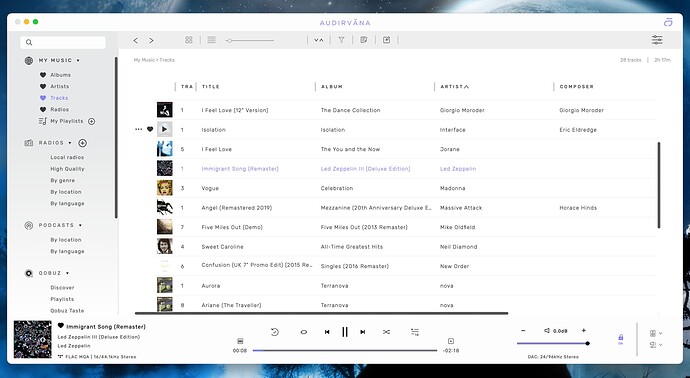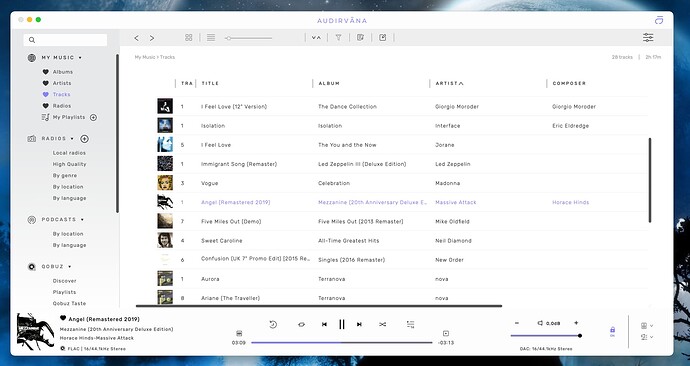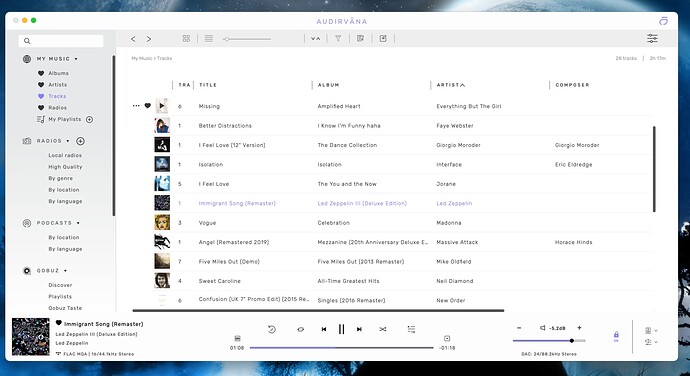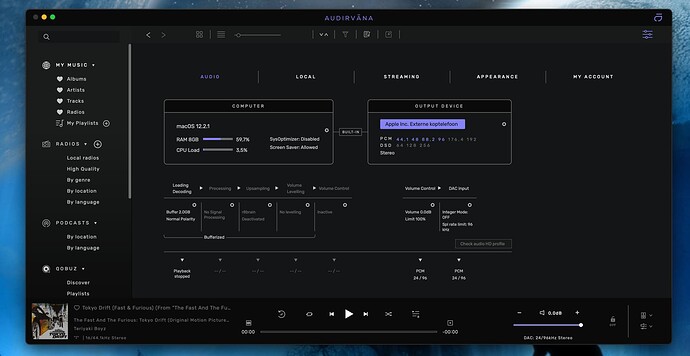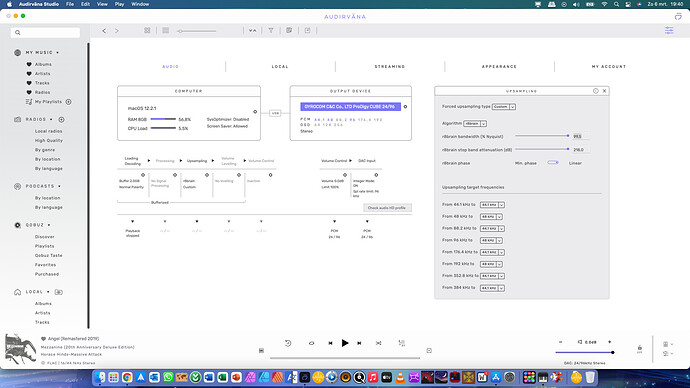Audirvana Studio 1.10.2 (11002)
macOS 12.2.1 with 8GB physical RAM
Connected account of : XXX
SIGNAL PROCESSING:
Polarity Inversion:
Globally: OFF
Per track: ON
Effects plugins NOT ACTIVE
UPSAMPLING:
r8brain not in use
r8brain filter parameters
Bandwidth = 99.5%
Stop band attenuation 218dB
Phase linear
AUDIO VOLUME:
Max allowed volume: 100
Replay Gain: None
SW volume control: OFF
LIBRARY SETTINGS:
Sync list: 1 folders
AUTO: /Volumes/Antarctica/Music
iTunes/Music library synchronization: not synchronized
Library database path: /Users/erwinbron/Library/Application Support/Audirvana/AudirvanaDatabase.sqlite
Remote Control server:
Listening on 127.0.0.1 on port 49159
ACTIVE STREAMING SERVICES
Qobuz: Connected as Qobuz Studio
TIDAL: Connected as PREMIUM
=================== AUDIO DEVICE ========================
CoreAudio audio path, buffer I/O frame size: 512
Max. memory for audio buffers: 5120MB
Exclusive access: Enabled
Integer mode: Enabled
Preferred device:
GYROCOM C&C CO., LTD PRODIGY CUBE 24/96
Model UID:ProDigy CUBE 24/96:1852:7921
UID:AppleUSBAudioEngine:GYROCOM C&C Co., LTD:Audiotrak ProDigy CUBE:124000:2,3
Currently playing in Integer Mode:
Device: 2ch Non-mixable linear PCM Interleaved 24bits little endian Signed Integer, 6 bytes per frame 96kHz
Active Sample Rate: 96kHz
Hog Mode is on
Bridge settings:
Sample rate limitation: none
Sample rate switching latency: none
Limit bitdepth to 24bit: OFF
Mute during sample rate change: OFF
Selected device:
Local audio device
ID 0x73 ProDigy CUBE 24/96
Manufacturer: GYROCOM C&C Co., LTD
Model Name: GYROCOM C&C Co., LTD ProDigy CUBE 24/96
Model UID: ProDigy CUBE 24/96:1852:7921
UID: AppleUSBAudioEngine:GYROCOM C&C Co., LTD:Audiotrak ProDigy CUBE:124000:2,3
6 available sample rates up to 96000Hz
8000
16000
32000
44100
48000
96000
Audio buffer frame size : 15 to 4096 frames
Current I/O buffer frame size : 512
Volume Control
Physical: No
Virtual: Yes
MQA capability
Auto-detect MQA devices: Yes
Not a MQA device, user set to not MQA
DSD capability: Unhandled
Device audio channels
Preferred stereo channels L:1 R:2
Channel bitmap: Ox3, layout:
Channel 0 mapped to 0
Channel 1 mapped to 1
Audio channels in use
Number of channels: 2
Use as stereo device only: No
Simple stereo device: Yes
1 output streams:
Number of active channels: 2, in 1 stream(s)
Channel #0 :Stream 0 channel 0
Channel #1 :Stream 0 channel 1
Stream ID 0x74 2 channels starting at 1
18 virtual formats:
2 ch Mixable linear PCM Interleaved 32 little endian Signed Float 96kHz
2 ch Mixable linear PCM Interleaved 32 little endian Signed Float 48kHz
2 ch Mixable linear PCM Interleaved 32 little endian Signed Float 44.1kHz
2 ch Mixable linear PCM Interleaved 32 little endian Signed Float 32kHz
2 ch Mixable linear PCM Interleaved 32 little endian Signed Float 16kHz
2 ch Mixable linear PCM Interleaved 32 little endian Signed Float 8kHz
2 ch Non-mixable linear PCM Interleaved 24 little endian Signed Integer 96kHz
2 ch Non-mixable linear PCM Interleaved 24 little endian Signed Integer 48kHz
2 ch Non-mixable linear PCM Interleaved 24 little endian Signed Integer 44.1kHz
2 ch Non-mixable linear PCM Interleaved 24 little endian Signed Integer 32kHz
2 ch Non-mixable linear PCM Interleaved 24 little endian Signed Integer 16kHz
2 ch Non-mixable linear PCM Interleaved 24 little endian Signed Integer 8kHz
2 ch Non-mixable linear PCM Interleaved 16 little endian Signed Integer 96kHz
2 ch Non-mixable linear PCM Interleaved 16 little endian Signed Integer 48kHz
2 ch Non-mixable linear PCM Interleaved 16 little endian Signed Integer 44.1kHz
2 ch Non-mixable linear PCM Interleaved 16 little endian Signed Integer 32kHz
2 ch Non-mixable linear PCM Interleaved 16 little endian Signed Integer 16kHz
2 ch Non-mixable linear PCM Interleaved 16 little endian Signed Integer 8kHz
24 physical formats
2 ch Mixable linear PCM Interleaved 24 little endian Signed Integer 96kHz
2 ch Mixable linear PCM Interleaved 24 little endian Signed Integer 48kHz
2 ch Mixable linear PCM Interleaved 24 little endian Signed Integer 44.1kHz
2 ch Mixable linear PCM Interleaved 24 little endian Signed Integer 32kHz
2 ch Mixable linear PCM Interleaved 24 little endian Signed Integer 16kHz
2 ch Mixable linear PCM Interleaved 24 little endian Signed Integer 8kHz
2 ch Mixable linear PCM Interleaved 16 little endian Signed Integer 96kHz
2 ch Mixable linear PCM Interleaved 16 little endian Signed Integer 48kHz
2 ch Mixable linear PCM Interleaved 16 little endian Signed Integer 44.1kHz
2 ch Mixable linear PCM Interleaved 16 little endian Signed Integer 32kHz
2 ch Mixable linear PCM Interleaved 16 little endian Signed Integer 16kHz
2 ch Mixable linear PCM Interleaved 16 little endian Signed Integer 8kHz
2 ch Non-mixable linear PCM Interleaved 24 little endian Signed Integer 96kHz
2 ch Non-mixable linear PCM Interleaved 24 little endian Signed Integer 48kHz
2 ch Non-mixable linear PCM Interleaved 24 little endian Signed Integer 44.1kHz
2 ch Non-mixable linear PCM Interleaved 24 little endian Signed Integer 32kHz
2 ch Non-mixable linear PCM Interleaved 24 little endian Signed Integer 16kHz
2 ch Non-mixable linear PCM Interleaved 24 little endian Signed Integer 8kHz
2 ch Non-mixable linear PCM Interleaved 16 little endian Signed Integer 96kHz
2 ch Non-mixable linear PCM Interleaved 16 little endian Signed Integer 48kHz
2 ch Non-mixable linear PCM Interleaved 16 little endian Signed Integer 44.1kHz
2 ch Non-mixable linear PCM Interleaved 16 little endian Signed Integer 32kHz
2 ch Non-mixable linear PCM Interleaved 16 little endian Signed Integer 16kHz
2 ch Non-mixable linear PCM Interleaved 16 little endian Signed Integer 8kHz
Local devices found : 4
Device #0: ID 0x61 LG Ultra HD Manufacturer: GSM Model UID: 1E6D085B-0000-0000-0B1C-0103803C2278 UID: 1E6D085B-0000-0000-0B1C-0103803C2278 Model Name: GSM LG Ultra HD
Device #1: ID 0x73 ProDigy CUBE 24/96 Manufacturer: GYROCOM C&C Co., LTD Model UID: ProDigy CUBE 24/96:1852:7921 UID: AppleUSBAudioEngine:GYROCOM C&C Co., LTD:Audiotrak ProDigy CUBE:124000:2,3 Model Name: GYROCOM C&C Co., LTD ProDigy CUBE 24/96
Device #2: ID 0x33 Externe koptelefoon Manufacturer: Apple Inc. Model UID: Codec Output UID: BuiltInHeadphoneOutputDevice Model Name: Apple Inc. Externe koptelefoon
Device #3: ID 0x2c MacBook Pro luidsprekers Manufacturer: Apple Inc. Model UID: Speaker UID: BuiltInSpeakerDevice Model Name: Apple Inc. MacBook Pro luidsprekers
UPnP devices found : 0
